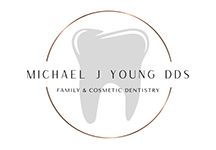While all cosmetic dentistry rejuvenates your smile, a veneers dentist can provide truly transformative effects. Veneers go on the front of your teeth and therefore can cover up a host of aesthetic concerns, from discoloration to slight alignment issues. Dr. Michael J. Young proudly provides porcelain veneers, made by a top-notch dental lab. He also offers composite veneers, otherwise known as dental bonding.
Read on to learn more about the different types of veneers and whether they are right for you. You can also contact us directly with any questions.
What’s the difference between porcelain and composite veneers?
Porcelain veneers are thin shells, custom designed to match your teeth and fabricated in a dental lab. Before providing veneers, Dr. Young will remove a small amount of enamel and etch the front of your teeth. This will make room for the porcelain and ensure a secure attachment. Because of this preparatory process, porcelain veneers are non-reversible.
Porcelain veneers enjoy great popularity. A survey by the American Academy of Cosmetic Dentistry found that they were the third most common dental treatment in 2013.
Composite veneers are applied directly to the front of your teeth, made from composite resin. Your veneers dentist will carefully sculpt this material for a smooth and natural shape. Once he has achieved the desired result, he will use a light to harden the composite. Bonding does not require significant alteration of your teeth, so the procedure is reversible.
Both porcelain and composite veneers can address the same issues and achieve similar results. Nonetheless, dental porcelain has a translucence and sparkle that composite resin does not. Therefore, porcelain veneers have a more lifelike appearance.
Am I a candidate for veneers?
If you wish to correct any of the following aesthetic concerns, you may be a good candidate for veneers:
- Internal discoloration that is impervious to teeth whitening
- Small cracks or chips that do not impact the structural integrity of your teeth
- Worn teeth or uneven edges
- Small gaps between teeth
- Jagged or unusually shaped teeth
To be considered for porcelain veneers, you must have enough dental enamel to undergo the preparatory process. If you have suffered enamel erosion, you may be a better candidate for bonding. Dr. Young can assess your teeth and recommend the most appropriate treatment at your cosmetic evaluation.
How long do veneers last?
According to the American Dental Association®, porcelain veneers last about ten years. With proper care, however, they may last longer. One study out of Austria found that the majority of patients still had functional veneers after two decades.
Dental bonding does not last as long as porcelain veneers. Typically, composite veneers have a lifespan of about three to ten years.
How do I take care of my veneers?
Caring for veneers is as simple as caring for your natural teeth. Be sure to brush and floss daily and make regular trips to the dentist. It is important to note that neither porcelain nor composite is as strong as natural dental tissue. You will be able to eat normally, but you should refrain from putting excessive pressure on your teeth. Do not use them to open packages or to perform other tasks that should be completed with your hands or with tools.
Caring for your veneers properly can help them reach their maximum lifespan.
Contact an Experienced Veneers Dentist Today
If you are looking for an outstanding veneers dentist, schedule a cosmetic evaluation with Dr. Young. He will be happy to answer your questions and help you choose the right type of veneers for your needs. Contact our office online or give us a call at 337-237-6453. Dr. Young provides cosmetic dentistry to patients in Lafayette, Delcambre, and the nearby communities.







